
Meet R/GA's Nick Pringle

As SVP executive creative director, Nick Pringle is R/GA London’s creative leader and is responsible for curating and leading the creative vision for the office, and driving the transformational work for which the agency is known.
A multiple Cannes Lions award-winning creative, Nick spent the last three years as R/GA New York’s VP, ECD leading work on some of the agency’s biggest clients including Samsung, Amex, and Shopify. Over the years he’s won 16 Lions, 8 OneShow pencils, and 7 D&AD pencils for work including Samsung’s Fornite Galaxy Skin, Volvo’s Highway Robbery, McDonald’s AR app: TrackmyMaccas and Volkswagen’s Nightmare Parks campaign.
Prior to joining R/GA, Nick worked at Grey New York as group creative director, where he led award winning work for clients including Volvo, P&G and Ally Bank. Nick also has additional global experience, as creative director at DDB in Sydney.
Q> Tell me about your career. How did you end up where you are today?
Nick> I started my career by stealing a book on advertising from a packing factory in my hometown. I thought it would stop my dad from asking, “What are you going to do when you graduate?” It worked. Months later I flicked through the paperback and got interested. The book was Ogilvy on Advertising. Six months later I got my first job in account management. 24 months later I switched to the creative department, and never looked back. After a decade in London, I moved to Sydney, Australia, and took my first Creative Director role. In 2013, I moved to New York to work with Grey, and some years later, R/GA. In 2020, I finally relocated back home as ECD of the R/GA London office.
Q> What advice would you give someone looking to begin their creative career journey? What skills should they start developing right away?
Nick> I love Quincy Jones. Quincy says “In music, there are really only 12 notes, but check out what they did with those 12 notes over the last hundred years.” The best way to start in this industry is to study what’s been done, see the patterns, see the tricks, then bring your twist to them. That personal twist is the magic, it can take time to realise that.
Q> How did the idea of Preservation Play come to fruition?
Nick> The inspiration was twofold. First, we saw how charities/NGOs were hit by the pandemic era—donations fell dramatically and government grants were diverted to COVID-19 relief efforts. Many faced bankruptcy. For environmental-based charities, in particular, the causes they worked on did not go away. We wanted to help.
With our client Project Zero in mind, we observed a huge increase in search traffic for nature videos helping viewers relax, sleep or be more productive—this content has nearly half a billion views on YouTube. However, for all these views, not one penny of ad revenue went back to protect those environments featured—resulting in lost revenue to the natural world of potentially millions. This accidental exploitation presented an opportunity to help by redirecting future revenues to conservation organizations.
Q> Why is Preservation Play important and how is it different from someone donating directly to an environmental NGO?
Nick> Until now donating has always been active. For example, you might give in the street, set up a payment plan, or add a donation to your bill. Preservation Play introduces the idea of ‘passive donating’. You watch, you relax, you do nothing. But you donate. It turns an established digital behaviour on its head by redirecting the ad revenue generated by your viewership to charities that protect the natural world - it’s a positive, passive loop.
Q> What creative work do you do in your own time? How does that influence your role at R/GA?
Nick> Outside of work, I’m deeply engaged in the growth of the metaverse. That passion has blurred pretty comprehensively with work—we now have a Direct-to-Avatar capability at R/GA, and we’re launching a virtual store in Decentraland for Vollebak; a tech-driven clothing brand that we started working with this year.
Q> How have you maintained your creativity throughout the pandemic?
Nick> It’s been largely unaffected for me. We’ve been busy with client work and proactive work. At times, the reduced office distraction has been a help.
Q> What creative or tech ideas will drive the industry forward in the next year?
Nick> The metaverse is the next creative frontier. We’ve only scratched the surface of what's possible with Blockchain, NFTs, and mixed-reality living. It’s going to be exciting to see our industry push what’s possible for brands in this space.













